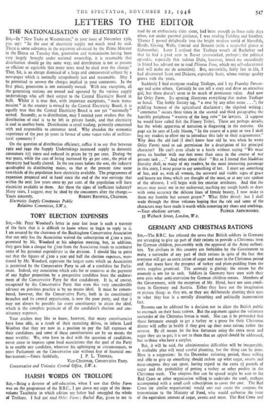LETTERS TO THE EDITOR
THE NATIONALISATION OF ELECTRICITY
Sta,—In "New Tasks at Westminster," in your issue of November 15th, you say: " In the case of electricity supply not much need be said. There is some substance in the argument advanced by the Prime Minister in the House on Tuesday that, generation and transmission having been very largely brought under national ownership, it is reasonable that distribution should go the same way; and distribution is not at present so efficient or equitable that many tears need be shed over the change." That, Sir, is an abrupt dismissal of a large and controversial subject by a newspaper which is normally scrupulously just and reasonable. May I be permitted to answer the charges implied in your comments. In the first place, generation is not nationally owned. With one exception, all the generating stations are owned and operated by the various supply undertakings who sell their output to the Central Electricity Board in bulk. Whilst it is true that, with important exceptions, " main trans- mission" in the country is owned by the Central Electricity Board, it is equally true that the Central Electricity Board is not yet " nationally " owned. Secondly, as to distribution, may I remind your readers that the distribution of coal is to be left in private hands, and that electricity is coal in another form. Distribution is retail trading, primarily concerned with and responsible to consumer need. Why abandon the economic experience of the past so years in favour of some vague rules of architec- tural symmetry ?
On the question of distribution efficiency, suffice it to say that between 5922 and 5940 the Supply Undertakings increased supply to domestic consumers 554 times and reduced its prices by 75 per cent. During the war years, while the cost of living increased by 4o per cent., the price of eleotricity had hardly altered. In the ten years before the war, the industry quadrupled its distributing mains, so that at the present time some two-thirds of the population have electricity available. The programmes of expansion proposed and in hand since the end of the war envisage that within the next few years some 95 per cent. of the population will have electricity available to them. Are these the signs of inefficient industry? Many tears, I suggest, may be shed by the consumers after the change.—
Yours sincerely, ROBERT RENWICK, Chairman. Electricity Supply Companies Public Relations Committee, S.W.r.


































 Previous page
Previous page